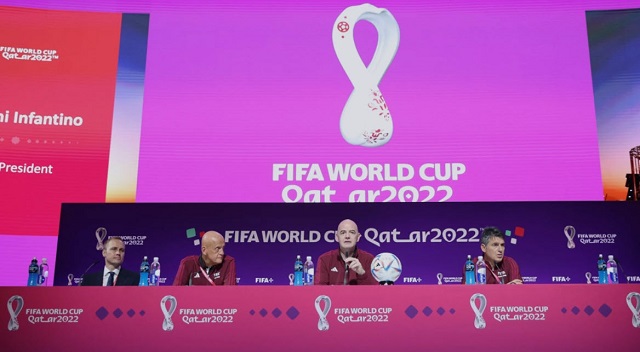
🌟World Cup 2022 kick-off
✳ November 20
⚽ Qatar vs Ecuador 7pm
Doha, Qatar | QNA | FIFA has reviewed the various technologies that will be used in the FIFA World Cup Qatar 2022 matches, especially the use of semi-automatic offside technology.
This came at a press conference held today, attended by FIFA President Gianni Infantino, in the conference room of the main media center, before the start of the 22nd edition of the tournament on Sunday.
FIFA President Gianni Infantino has expressed his full support to the match officials at the FIFA World Cup, praising their dedication, professionalism and ability to cope with pressure. “These 129 match officials are doing the most difficult job of all of us, either here in Qatar or at home” he said. “They are top professionals; they are motivated in an incredible way.” “The referees are for us are not only one team, but they are Team One. They are the most important team at the World Cup because without the referees team, there is no World Cup.” The FIFA President suggested that fans who get angry at decisions should try to put themselves in the referees position.
“I am as much a fan as everyone else and I get upset as much you when there is a mistake or when I simply don’t agree with the decision of the referee because I support a particular team,” he said.
“I am asking everyone to try to put yourselves in the shoes of the referees just for a moment (imagine) you were on the ground in front of 80,000 people in a stadium, a few hundred million on television and you have to take instant decisions which can affect entire countries.” VAR offside decisions will be quicker and more accurate at the World Cup after the introduction of new technology developed by FIFA over the last three years, referees chief Pierluigi Collina said during the conference.
The “semi-automatic offside technology” will rule on even the tightest offside decisions more quickly than under the previous system and a 3D animated rendering of the incident will be broadcast for fans in the stadium and on TV.
“(It) gives us the possibility to be faster and more accurate in terms of decisions about offside,” Collina said in a briefing ahead of the tournament.
“Just to be clear, being faster does not mean we will have instantaneous assessment of offside. It will be less than now, certainly, but we cannot have an answer one-second, or basically live.
“One thing I want to underline is the final decision always belongs to the match official — on the VAR, the video assistant referee, on the field of play, to the referee.” Twelve cameras in each stadium will track 29 points on the body of each player and a sensor inside the match ball will send data to the VAR operations room 500 times a second to allow a highly accurate assessment of when the pass was played.
The new technology has already been tried out at two FIFA tournaments and in test matches at all the stadiums hosting matches at the World Cup.
“We analyzed the data and the outcome was very positive,” said Johannes Holzmueller, FIFA’s director of technology and innovation.
“It’s the most accurate supporting offside tool at the moment.” Holzmueller said the previous offside technology would be available in Qatar but only as a back-up.
Collina said his team had briefed all 32 team coaches at two workshops and visited each of the team camps to reinforce their message to players.
Referees had been instructed to sanction anything that would endanger the health of another player with red cards, including elbows to the face, studs up tackles and dangerously high feet.
“Here are presented the best players in the world,” Collina said. “It would be a shame if some of these players would be unable to play because of an injury caused by an opponent.
“So the first message we went through was to protect the safety of the players. Something that may endanger the safety of an opponent, players and coaches should expect… a red card.” Simulation, although less popular than before the advent of VAR, would continue to be punished, as would dissent, the Italian added.
Collina said FIFA were particularly keen to ensure as much playing time as possible so referees had been instructed to accurately time stoppages and add minutes to the end of a half.
****
SOURCE: QNA
 The Independent Uganda: You get the Truth we Pay the Price
The Independent Uganda: You get the Truth we Pay the Price



